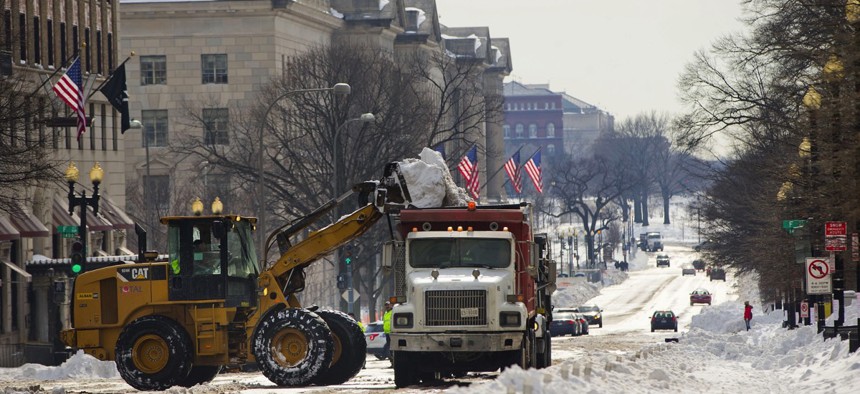Here’s How Some Cities Are Mobilizing Citizens in Blizzard Response

Heavy equipment fills a dump truck with snow as clearing begins Monday on 15th Street near the White House in Washington, D.C. Post-blizzard, residents face slippery roads, spotty transit service, mounds of snow, and closed schools and government offices. Pablo Martinez Monsivais / AP Photo

Connecting state and local government leaders
Beyond paying for snow-clearing help, many municipalities hope residents will pitch in to help their community—and stay off the roads.
Cleaning up from a massive winter snowstorm can be an extremely heavy lift, even in large cities that have robust municipal public works operations. We’re seeing that in jurisdictions along the highly populated East Coast, which is digging out from a massive storm system that has broken snowfall records or come close to topping records in many localities.
In Queens, New York, for instance, the New York City Department of Sanitation dispatched 850 snowplows to clear roadways in city’s largest borough by land area, but Mayor Bill de Blasio admitted the city didn’t do a good job in some Queens neighborhoods.
Sometimes even with the ability to deploy a large show of municipal force, an agency has to find other resources in the immediate recovery.. New York’s Department of Sanitation, for example, made an appeal for additional paid laborers to clear sidewalks of snow and ice.
"While the uniformed men and women of the Department of Sanitation concentrate their efforts on city streets, Emergency Snow Laborers will be vital to keeping the city moving after this massive snowfall," New York City Sanitation Commissioner Kathryn Garcia said in a statement. "Their help, in targeting the city's thousands of crosswalks, fire hydrants and bus stops, will allow for the quicker removal of snow in the areas pedestrians frequent."
The agency is paying snow laborers $13.50 per hour and $20.25 per hour, after 40 hours are worked in a week.
While paying people to clear snow is one way to boost a city’s public works response to a massive winter storm, it’s not something all municipal governments can afford. In many cases, cities must make an appeal to citizens to assist.
In Philadelphia, the city used social media to encourage residents to dig out fire hydrants, which is critical for public safety—fires, unfortunately, do not take a hiatus during snowstorms.
The Water Department posted an image of how to properly dig out a fire hydrant or keep the hydrant area clear of snow.
The Philadelphia Fire Department, naturally, endorsed the #PrideInYourHyd efforts.
Philadelphia, like many other city governments, was mindful to encourage safe shoveling behaviors, since these types of weather events can lead to shoveling-related injuries or cardiac arrest. (A well-known long-time Capitol Police officer in Washington, D.C., died while shoveling snow at home in Delaware.)
“While shoveling, citizens should pace themselves, take breaks, and plenty drink water during breaks to avoid dehydration,” according to the city’s #PHLsnow Resources page. “Take a break if you’re beginning to sweat, as bodies lose heat faster in damp clothes. Also, don’t smoke or eat a heavy meal before shoveling.”
While cities have been using social media to engage citizens before, during and after the storm, Baltimore Mayor Stephanie Rawlings-Blake reminded her residents to be careful while walking.
In the District of Columbia, local officials have reminded property owners of their obligations to clear sidewalks of snow under recently instituted legislation that strengthened rules and penalties. But the D.C. government won’t actually fine violators due to a bureaucratic delay, NBC Washington reported.
But the Metropolitan Police Department has made clearing the streets of the nation’s capital a public safety issue and wants drivers off of city roadways during the recovery effort. As The Washington Post reported Monday, Chief Cathy Lanier said that drivers who get stuck could face fines up to $750.
“Stay home for another day,” Lanier said, according to the Post. “Even 4-wheel drives … we are seeing 4-wheel drives that are getting stuck out here. Even our snow plows are getting stuck … there are still some very, very dangerous spots.”
The D.C. government has a volunteer “snow team” effort aimed at clearing sidewalks for senior citizens and those with disabilities.
D.C. Mayor Muriel Bowser announced Monday that she would apply for federal funding assistance to help with cleanup efforts in the nation’s capital.
Some other scenes of the public works response efforts in the impacted areas …
Michael Grass is Executive Editor of Government Executive’s Route Fifty. Quinn Lisbon contributed to this report.

NEXT STORY: SAVER: A Consumer Reports for first responders





